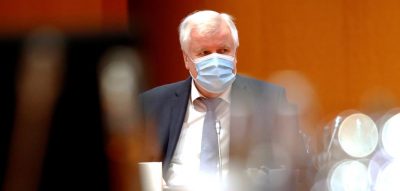Germany’s Ministry of the Interior Hired Scientists to Justify “Tough Corona Measures”

All Global Research articles can be read in 27 languages by activating the “Translate Website” drop down menu on the top banner of our home page (Desktop version).
***
.
GR Editor’s Note
The following text is a translation of an article published in Die Welt am Sonntag, which reveals a secret plan by Germany’s Ministry of the Interior to justify repressive social measures pertaining to the Covid-19 pandemic.
The intent was to deliberately trigger a fear campaign based on what might be described “fake science”.
A “worst-case scenario” was calculated according to which more than a million people in Germany could die of the coronavirus if social life were to continue as it was before the pandemic”.
The original article in German is published below. Translation by Global Research.
The secret plan had been revealed in May 2020 by a Ministry of the Interior official.
In May GR published an article entitled German Official Leaks Ministry of Interior Report Denouncing Corona as ‘A Global False Alarm’.
As reported by Der Spiegel on May 15, “Stephen Kohn, the whistleblower working for the Ministry of Interior was fired”.
Michel Chossudovsky, Global Research, February 10, 2021
***
An extensive correspondence, which WELT AM SONNTAG has reviewed confirms that in the first high phase of the pandemic, the office of Interior Minister Horst Seehofer commissioned the hiring of researchers. Thereupon they provided results for a dramatic “secret paper” of the ministry.
The Federal Ministry of the Interior engaged scientists from several research institutes and universities for political purposes in the first wave of the corona pandemic in March 2020. It commissioned the researchers from the Robert Koch Institute and other institutions to create a calculation model on the basis of which the Ministry of the Interior, Horst Seehofer (CSU), wanted to justify tough corona measures.
This emerges from more than 200 pages of internal correspondence between the management level of the Ministry of the Interior and the researchers, which WELT AM SONNTAG has received. A group of lawyers have revealed the e-mail correspondence in a legal dispute with the Robert Koch Institute that lasted several months.
In an exchange of e-mails, the State Secretary in the Ministry of the Interior, Markus Kerber, asked the researchers to develop a model on the basis of which “preventive and repressive measures” could be planned.
According to the correspondence, the scientists worked in close coordination with the ministry in just four days to develop content for a paper that had been declared secret, which was distributed via various media over the following days.
A “worst-case scenario” was calculated according to which more than a million people in Germany could die of the coronavirus if social life were to continue as it was before the pandemic.
Original Text in German
Ein umfangreicher Schriftwechsel, der WELT AM SONNTAG vorliegt, zeigt: In der ersten Hochphase der Pandemie wirkte das Haus von Innenminister Horst Seehofer auf Forscher ein. Daraufhin lieferten sie Ergebnisse für ein dramatisches „Geheimpapier“ des Ministeriums.
Das Bundesinnenministerium spannte in der ersten Welle der Corona-Pandemie im März 2020 Wissenschaftler mehrerer Forschungsinstitute und Hochschulen für politische Zwecke ein.
Es beauftragte die Forscher des Robert-Koch-Instituts und anderer Einrichtungen mit der Erstellung eines Rechenmodells, auf dessen Basis die Behörde von Innenminister Horst Seehofer (CSU) harte Corona-Maßnahmen rechtfertigen wollte.Das geht aus einem mehr als 200 Seiten starken internen Schriftverkehr zwischen der Führungsebene des Innenministeriums und den Forschern hervor, der WELT AM SONNTAG vorliegt. Eine Gruppe von Juristen hat den E-Mail-Verkehr in einer mehrmonatigen rechtlichen Auseinandersetzung mit dem Robert-Koch-Institut erstritten.
Im E-Mail-Wechsel bittet etwa der Staatssekretär im Innenministerium, Markus Kerber, die angeschriebenen Forscher, ein Modell zu erarbeiten, auf dessen Basis „Maßnahmen präventiver und repressiver Natur“ geplant werden könnten.Die Wissenschaftler erarbeiteten dem Schriftverkehr zufolge in nur vier Tagen in enger Abstimmung mit dem Ministerium Inhalte für ein als geheim deklariertes Papier, das in den folgenden Tagen über verschiedene Medien verbreitet wurde.Darin wurde ein „Worst-Case-Szenario“ berechnet, laut dem in Deutschland mehr als eine Million Menschen am Coronavirus sterben könnten, würde das gesellschaftliche Leben so weitergeführt wie vor der Pandemie.
Copyright, Die Welt am Sonntag. Our thanks to Die Welt.
*
Note to readers: please click the share buttons above or below. Forward this article to your email lists. Crosspost on your blog site, internet forums. etc.
Featured image: Bundesinnenminister Seehofer drängte während der ersten Hochphase der Pandemie auf harte Maßnahmen – und ließ sein Haus kreativ dabei werden, sie zu rechtfertigen

